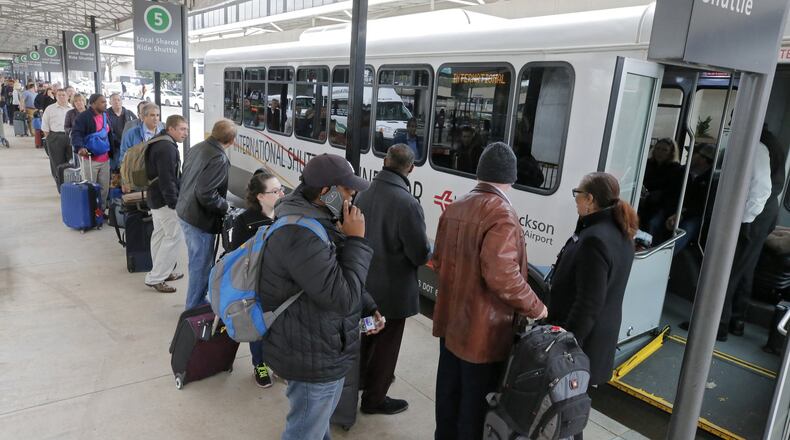Hartsfield-Jackson International Airport plans to buy two electric shuttle buses with a price tag of $750,000 each, and is seeking Atlanta City Council approval for the move.
City council members challenged the cost at a transportation committee meeting this week.
“I’m not convinced that this is after all the smartest thing to do,” said Councilman Amir Farokhi.
The buses made by electric vehicle manufacturer BYD would join a fleet of "terminal-to-terminal" shuttles used to transport passengers between the international and domestic terminal and shuttles that go from the international terminal to the rental car center.
While the airport’s Plane Train can transport passengers who have cleared security between terminals and to all of the concourses, those bound for Atlanta who arrive on flights and exit security must take the shuttle if they want to get from the international terminal to MARTA, for example.
A Sky Train takes passengers to the rental car center from the domestic terminal, but not from the international terminal. Dozens of buses are used for the shuttle operation, run through the airport’s parking contractor.
Some passengers have complained the current buses are too small and don’t have enough room for baggage. The electric buses can carry 22 passengers, larger than the airport’s current 14-passenger shuttles, according to Hartsfield-Jackson general manager Roosevelt Council. Some of the current gas-powered shuttles will be retired and replaced by the electric shuttles, he said.
In total, the buses and related infrastructure will cost more than $1.8 million. That includes $1.5 million for the two buses, $265,000 for the design and construction of power infrastructure and $88,578 for construction of electric chargers. The airport is seeking approval to increase its parking division’s budget for the two 40-foot electric buses and two charging stations.
If approved, half of the cost would be covered by a Federal Aviation Administration Voluntary Airport Low Emissions grant, while the other half, or $926,789, would be paid for with Atlanta airport funds.
Councilman J.P. Matzigkeit said he was concerned that “we go with this because it’s half off, and now we’re stuck with a solution that is really, really expensive compared to other alternatives.”
Hartsfield-Jackson, the world's busiest airport, is host to thousands of vehicles and airplanes that generate greenhouse gas emissions every day. The electric bus project at the airport started several years ago under then-Mayor Kasim Reed, who said he wanted to "make Hartsfield-Jackson one of the greenest airports." The procurement of the buses was done through the airport's parking contractor at the time, Standard Parking, which held a bidding process for the buses.
“I think this is kind of what an airport like Hartsfield-Jackson should be doing,” Council said. He said he doesn’t expect the fleet to be dominated by electric buses, but added: “Whenever we actually have the opportunity to try to reduce the emissions, we try to take advantage of it, especially when there’s available federal funding.”
Airport officials told council members in a memo that diesel buses cost $300,000 to $600,000, while natural gas buses cost $670,000 to $714,000. The electric buses are expected to last ten years, and it will take “less than seven years” for them to break even, based on fuel costs and reduced costs for operations and maintenance, according to the airport.
The city council’s transportation committee voted 4-2 to approve the measure for the buses, with Andre Dickens, Carla Smith, Marci Collier Overstreet and Dustin Hillis in favor and Farokhi and Matzigkeit against it. Council members want more information on the procurement process by Standard Parking for the buses before the resolution goes to the full city council for a vote on May 7.
The price tag for two electric shuttle buses
Cost
- Two electric shuttle buses: $1.5 million ($750,000 each)
- Design and construction of power infrastructure: $265,000
- Construction of electric chargers: $88,578
- Total: $1,853,578
Funding
- $926,789 from FAA grant
- $926,789 from City of Atlanta Department of Aviation
Source: Hartsfield-Jackson
About the Author
Keep Reading
The Latest
Featured



